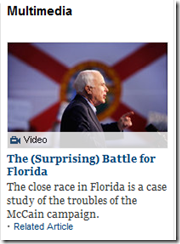 The New York Times has dropped even the pretense of applying a delicate coat of sophistication to their bias. Perhaps this is just a strategy born of the Old Grey Lady's survival impulse, that by leaning hard to the left they might hijack the readership of the Village Voice and thus delay their hastening demise.
The New York Times has dropped even the pretense of applying a delicate coat of sophistication to their bias. Perhaps this is just a strategy born of the Old Grey Lady's survival impulse, that by leaning hard to the left they might hijack the readership of the Village Voice and thus delay their hastening demise.
The picture accompanying this post was a teaser on the New York Times web edition's Politics main page at midday today. It wasn't an extraordinary experience, finding an example of liberal bias. No cause to bring in Mulder and Scully, but was it an accident that the photog was lined up perfectly for the shot that placed Senator McCain's head in the middle of the bold red 'X' that is is, in fact, the Florida state flag?
Plausible deniability will be the order of the day if some of the bigger blogs notice this image and shake the Times for comment, but it is ultimately the photo editor who chose this one image out of hundreds available of the Republican candidate.
Since the press has advocated the idea that Americans respond to - or even act on - subtle messages embedded within speech and images, we owe it to them to take a moment and consider the potential message being transmitted by the Times' photo. (It is uncredited, so I'm going to assume it belongs to the Times.)
If memory serves me, the bold red 'X' is used most frequently to label something in need of elimination. It is a shorthand, easy for our eye and mind to interpret and store without conscious thought.
Is the Times sending out subliminal orders that McCain is to be "eliminated"? Of course not, but this kind of sophomoric camera work used to be relegated to news blooper segments on The Tonight Show, not applied to the sober business of reporting from the campaign trail.
Does this kind of juvenile antic really rise to a level worth spending a great deal of time talking about? Were the Times' photographer to have carefully lined up Senator Obama so that his cranium was centered betwixt a red 'X', would the NAACP or the DNC have anything to say about it? They would label it inflammatory and say that it might be sending a message that Obama should be targeted and eliminated. My feeling is that such hypothetical charges would be fair and justified.
 The media has truly abused its license in its coverage of this election. We rely on the media for information and context, and we need it to be stripped as cleanly as possible of bias, or labeled appropriately in the case of commentary or opinion. Our way of life breaks down without a free and responsible press. This very fact is what makes reform such a challenging proposition.
The media has truly abused its license in its coverage of this election. We rely on the media for information and context, and we need it to be stripped as cleanly as possible of bias, or labeled appropriately in the case of commentary or opinion. Our way of life breaks down without a free and responsible press. This very fact is what makes reform such a challenging proposition.
One would have thought that reform would have been self-imposed, within media organizations, as the market of ideas began to heat up with the ascendancy of Fox News, talk radio and Internet blogging. Instead, the traditional media have attacked those new media and the people who consult them for news and information. The mainstream media are championing the cause of the candidate who is most likely to impose federal guidelines for how the media comment on news, much as the British loyalists of Revolutionary America courted the aristocracy in a vain attempt to gain favor with power as a means of protecting their own way of life.
Our system was built with an elegant attention to checks and balances, to prevent the government ascribing enough power to itself that it would cast aside the "negative liberties" Obama lamented in his 2001 interview on Chicago Public Radio. All of the bodies of government were placed under the watchful guard of the press, who the government was specifically not allowed to tamper with. This is as it should be, but then who stands vigilant over the press to ensure that it does not become drunk with its own power?
 With the power to shape opinions, set norms, transmit values - all of that glorious sociological material that you should have been learning in your Communications 101 class - the press is only constrained by how much power the public feeds to them by either being an audience of buying advertisers products. The question for us now is: Are the press acting responsibly, or are they abusing their power?
With the power to shape opinions, set norms, transmit values - all of that glorious sociological material that you should have been learning in your Communications 101 class - the press is only constrained by how much power the public feeds to them by either being an audience of buying advertisers products. The question for us now is: Are the press acting responsibly, or are they abusing their power?
Place the journalistic and editorial decisions involved in two stories side by side and make a common sense judgment of whether the press is doing their job.
In the case of Joe the Plumber, as the substance of a story begins to hurt Senator Obama, Joe, who questioned the candidate on the nature of the candidate's economic views has reporters investigating his past, digging for dirt. His reputation is sullied; he is smeared.
In another case, a single reporter for a small-town newspaper claims to have heard someone yell, "Kill Him," at a McCain-Palin rally. Although the reporter gives no description of the alleged hate speaker, no other witnesses have reported hearing the remark and Secret Service on the scene do not report hearing or seeing any such event, the story is reported as fact by a variety of willing media sources with the commentary added to imply that the McCain-Palin campaign is generating and tolerating a dangerous culture of hate and violence.
How do we communicate to the communicators that we want balanced reporting? The answer is... competition and consolidation. Maybe an editor or two who don't have Carter campaign buttons in their junk drawer. It would be a start. Since many papers are losing readers, I would think it might don on one or two to try something... different? Who knows? If it worked it might spread to other papers. My guess is that's what they're afraid of, but I would think that unemployment would scare editors more than the distaste they might have for working alongside people with different points of view.
I am not saying that liberal voices in media are a cancer that needs to be excised. America is a fabric of competing ideas, but the ideas must compete honestly in order for the system to properly function. If the 'debate' consists only of contradiction, but does not contain elements of agreement, it fails miserably to arrive at conclusions and only serves to polarize supporters of propositions pro or con.
The media should, at least, be functioning as an impartial referee, sorting through the partisanship to keep both sides honest. As they currently operate, the media is furthering the endemic apathy (verging on nihilistic compulsion) in the public-at-large.
Still, there are signs that the public wants something different. The commencement of a purge in traditional print media begins with the rapid downgrading of New York Times bond issues, this in the same time that non-traditional media are thriving. There will be advancements in how non-traditional media delivers its content that may make it far easier for "small" media to develop the kind of large circulation that big newspapers had at one time. In the entrepreneurial period, there are always opportunities for new content and forms of presentation to emerge. In that phase, the public can have its greatest impact on how news is reported.
 The need for reform in our media is great.
The need for reform in our media is great.
The results of a poll done by the Pew Research Center showed that 70% of respondents believed that the media favors Obama to win the upcoming election versus 9% who believe they favor McCain. (You might be surprised to learn that only 8% feel that the media supports neither candidate, but that is actually the highest percentage since the first time the poll was taken during the 1992 election.)
When the election is over, and the ballots have been counted, vetted, and possibly recounted, a discussion of how consumers of media can effect reform will have to occupy some of our attention, regardless of who will occupy the White House next year. The abuses of the media in this election have been committed in pursuit of vengeance against a party they don't like, but with reckless disregard to their ultimate duty in our society, the duty to provide for the "public enlightenment ... by seeking truth and providing a fair and comprehensive account of events and issues." (That's excerpted from the Society of Professional Journalists Code of Ethics. Context intact.)
The media has a conscience and they know in what instances they have fallen down on their responsibilities. If they feign amnesia, remind them. If they promise to do better, hold them to that promise. Organize a letter-writing campaign to the editor of your least favorite newspaper, detailing stories in which context was tipped to favor one ideology over another. Offer suggestions for creating balance. Do anything except doing nothing.
Most importantly, don't take no for an answer and let them know that you want to take their newspaper every morning, but not until they take their job seriously. We have serious - in some cases, deadly serious - issues to grapple with in the coming years and we need our media news system to be functioning at optimal levels to give us clear information so that we can make sound, informed decisions.




